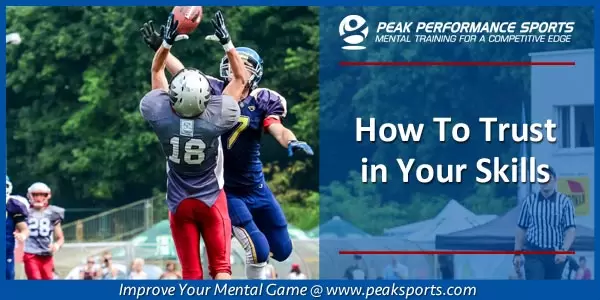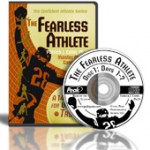
Trust In Your Skills
Do you (or your athletes) over-think during competition? This is very common in my work as a mental coach.
If you are a perfectionist, you are prone to over-analyzing how well you are performing…
This is know as “paralysis by analysis” in our work. Paralysis by analysis is a term used to describe athletes who think too much and thus perform tentatively in competition.
I’m currently working with a hockey player right now that thinks too much on the ice. He gets bogged down in decision making: do I pass, shoot, or skate around the defender?
If you practice the right way… You condition your body to react in competition… As a matter of fact that’s one of the objectives of practice–to help you trust in your skills.
This is when your body seems to know just exactly what to do in games…
“Paralysis by analysis” is when thinking interferes with action that you otherwise perform routinely.
Peak performance is more about doing than learning. If you can learn to trust your training and your skills, you allow your body to do what you have trained it to do.
University of Maryland junior quarterback Perry Hills is focusing on ‘not overthinking’ throws. Perry started seven games as a freshman before tearing an ACL then being redshirted the following year.
In his 2015 opener, Perry found himself pressing, having difficulty with accuracy and completing only 12 of 21 passes.
PERRY: “You got to, as a quarterback, just get to making the reads and reacting. Not overthinking, ‘Okay, where do I place this ball?’ I mean I’ve been playing this game since I was 5 years old, so it’s just going to come down to reading and reacting.”
I like the phrase “reading and reacting” as this says it all. The key to optimal performance is freeing yourself up to react during games.
Practice is a good time to assess and analyze your game. This is when you work on improving your skills and strategy for competition.
Competition is the time to just execute your game plan… to let it flow or be on autopilot.
Athletes who read and react perform intuitively… That is to say, you trust your body to respond just like you trained it to respond.
But it all starts in practice….
If you practice the right way, your technique or form becomes over learned, which requires no conscious thought or effort.
This “read and react” mindset frees you to react to the demands of the game, which helps you get into the zone.
Remember, your goal in practice is train hard in practice so you can trust your skills in competition: Look and react.
Tips for Reading and Reacting
*Too many athletes over coach themselves during a game when they should be getting the most from their skills. Use the skills you have on game day.
*Focus on your strategy or game plan. For example, a swimmer might think about her race plan.
*Under pressure, some athletes tend to over think and over control because it helps them play it safe and not make mistakes. You can’t perform your best when you protect from making mistakes.
If you want to learn more about how to perform with freedom and let go of fear, check out The Fearless Athlete CD program.
Read More About The Fearless Athlete Program
Related Sports Psychology Articles
- How to Stop Overthinking in Competition
- How to Refocus After Making Mistakes
- Helping Basketball Players Adopt the Shooter’s Mindset
*Subscribe to The Sports Psychology Podcast on iTunes
*Subscribe to The Sports Psychology Podcast on Spotify
Download a free sports psychology report to improve your mental game!
Learn more about our one-on-one mental game coaching.
The Fearless Athlete

For the last two decades, I’ve been working with athletes and helping them optimize their physical ability by teaching them the secrets of top performing athletes. Now, you too can learn how to regain that child-like fearless attitude.
Mental toughness is what separates the winner from the loser in any competition. Champion athletes train hard in practice, perform without fear in competition, and trust their skills in crunch-time.
The Fearless Athlete program is ideal for any athlete that wants to overcome fear of failure and uncover inhibiting perfectionistic traits; or for any coach or parent who wants to teach athletes to perform with trust and freedom in competition.
